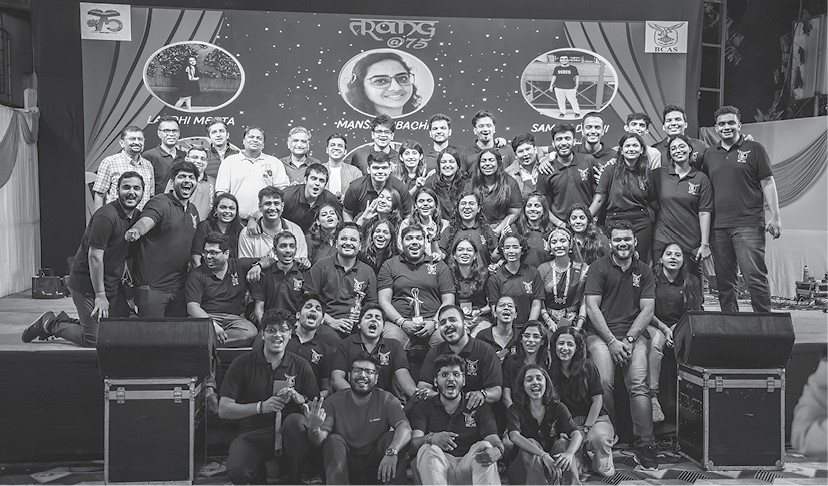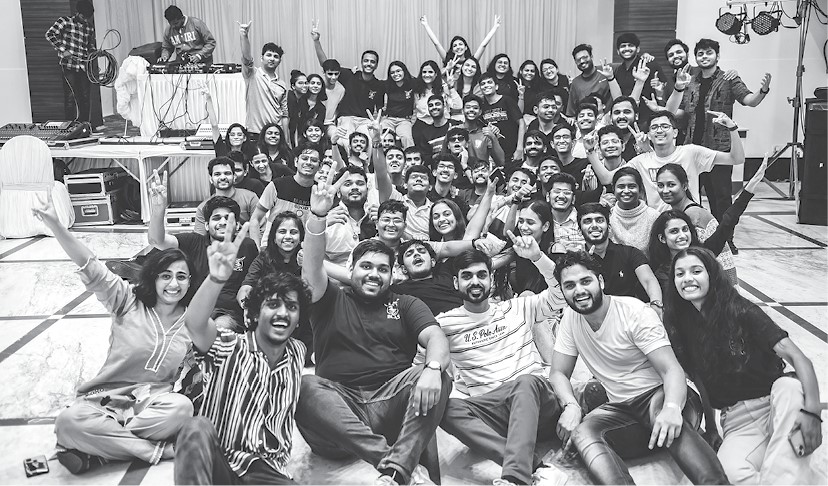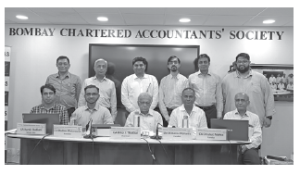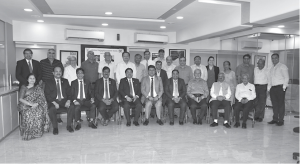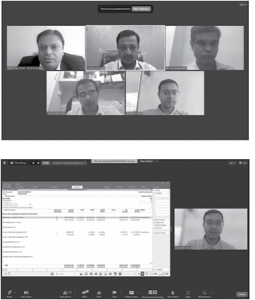1. CA Pariksha Pe Charcha held on Saturday, 6th December 2025@ Virtual.
Speakers: CA K S Ranjani, CA Heramb Maheshwari, CA Utsav Shah, CA Nidhish Naik, CA Naman Gupta, CA Ansh Bhorawat & CA Anjali Shukla
The Human Resource Development Committee of BCAS organised “CA Pariksha Pe Charcha”, an interactive learning session designed to guide CA students in their exam preparation journey. The program commenced with an inspiring keynote by CA K S Ranjani, who spoke on resilience, overcoming setbacks, and developing a success-oriented mindset. This was followed by an insightful session by CA Heramb Maheshwari (AIR 1 – November 2024), who shared his exam preparation journey, practical exam strategies and clarified ICAI evaluation myths.
A dynamic panel discussion featuring top rankers from the September 2025 CA Final exam brought real-life perspectives on study routines, discipline, answer writing, and balancing mental well-being. Students from across the country participated enthusiastically, making the session highly engaging and impactful.
Overall, the program provided a blend of motivation, actionable techniques, and relatable experiences, helping students approach their CA journey with clarity, confidence, and a structured plan.
Scan to watch on Youtube

2. Webinar on New Labour Codes: Legal Framework, Financial Impact & Practical Implementation held on Friday, 5th December 2025@ Virtual.
The Finance, Corporate and Allied Laws Committee of the Bombay Chartered Accountants’ Society organised a webinar on “New Labour Codes: Legal Framework, Financial Impact & Practical Implementation” on Friday, 5th December 2025.
The Finance, Corporate and Allied Laws Committee of the Bombay Chartered Accountants’ Society organised a webinar on “New Labour Codes: Legal Framework, Financial Impact & Practical Implementation” on Friday, 5th December 2025.
The programme was conducted in two segments. Adv. Sundeep Puri covered the legal and conceptual aspects of the Codes, explaining the structure, intent and major changes introduced. CA Alok Agarwal and CA Bhavin Rajput discussed the financial, compliance and implementation-related implications, highlighting areas requiring organisational preparedness, policy review and systems alignment.
The webinar received an encouraging response from members across practice and industry. 316 participants enrolled for this webinar from 50+ cities and towns across India. Participants appreciated the clarity of explanations and the practical insights shared by the speakers.
Scan to watch online at BCAS Academy

3. AARAMBH – Making Articleship Count held on Thursday, 04 December, 2025 @ HR College of Commerce & Economics, Churchgate, Mumbai

Every meaningful journey begins with a purposeful start. Aarambh, meaning a new beginning, represents BCAS’s commitment to guiding CA students at one of the most defining stages of their professional journey – the commencement of articleship.
Through the Aarambh – Making Articleship Count Initiative, BCAS fulfils its professional social responsibility by engaging directly with students and sharing practical insights, real-life experiences, and guidance from young Chartered Accountants who have recently walked the same path. The sessions are designed to bridge the gap between academic learning and professional realities, enabling students to approach articleship with clarity, confidence, and a long-term perspective.
The first session under this initiative was held at H.R. College of Commerce & Economics, Churchgate, Mumbai, on Thursday, 4th December 2025. The programme was made possible through the wholehearted support and cooperation of Principal Mrs. Pooja Ramchandani and Director – Placement, Dr. Navin Punjabi.
The programme witnessed enthusiastic student participation, driven by an engaging panel discussion and vibrant interaction. The presence and encouragement of the team BCAS – President CA Zubin Billimoria, Hon. Joint Secretary CA Mrinal Mehta, Managing Committee member CA Anand Kothari, and the panelists from Core Group CA Mahesh Nayak, CA Aditya Pradhan and CA Vatsal Paun, further reinforced the Society’s collective commitment to nurturing the future torch-bearers of the profession.
BCAS remains steadfast in its mission to mentor, inspire, and support the next generation of Chartered Accountants, contributing meaningfully to the profession and to the nation at large.
4. FALCON – Making Articleship Count held on Wednesday 03rd December, 2025 at N M College of Commerce & Economics, Vile Parle, Mumbai
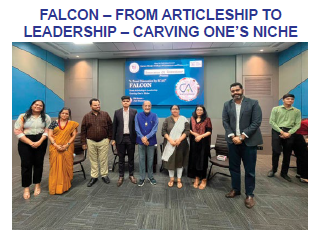
The falcon bird symbolises vision, power and victory. With this initiative, BCAS offers young CA aspirants an opportunity to interact and learn from young Core Group members – those who have walked the path before them. The panellists dwell on the topics of Articleship, Post Qualification, Professional Association & Networking, and Leadership. To ensure that the aspirants feel both comfortable and confident to engage with the panellists, the initiative has BCAS meet them on their home turf – be it college, or coaching class or even CA firm.
The first session under this initiative was held at N M College of Commerce & Economics on Wednesday, 3rd December 2025. Principal Dr Parag Ajgaonkar and Vice Principal CA Dr Savita A Desai of the college personally welcomed the visiting team from BCAS comprising the President, CA Zubin Billimoria, Managing Committee member, CA Preeti Cherian and the three panellists – Managing Committee members, CA Samit Saraf and CA Sneh Bhuta and Core Group member, CA Vedant Gada. The session was ably supported by the Association of Accountancy Committee of N M College. The audience, comprising degree college students who are set to embark on this wondrous journey, found the discussion both informative and helpful.
From the BCAS perspective, engaging with the students as they commit themselves to a demanding, yet extremely satisfying career choice is imperative – these students are the face of tomorrow of the profession.
In the words of the American author, Mercedes Lackey, “The hatched chick cannot go back to the shell, the falcon who has found the sky does not willingly sit the nest.”
5. CATHON (Marathon) – Run for Fitness, Fun and Purpose held on Sunday, 30th November 2025 @ Iconic Bandra Fort, Mumbai.
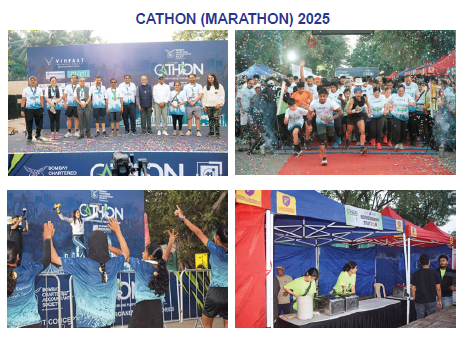
India’s Second Edition of CA-Thon 2025 – A Run for Fitness, Fun & Purpose was organized on Sunday, 30th November 2025 near Bandra Fort, Mumbai under the aegis of the Seminar, Membership & Public Relations (SMPR) Committee.
The event attracted 2,000+ participants – Chartered Accountants and non-Chartered Accountants alike – between the age group of 8 to 70 years – drawn from all walks of life, from different corners of the country. An added feature this year was the participation of select CA firms that enlisted their team members for the run.
The annual event helped increase the visibility of Brand BCAS, cement relationships within the community, promote health and fitness among participants drawn from all walks of life and contribute to a righteous cause (part of the proceeds went to donating professional sewing machines to women from marginalized communities, to help them become entrepreneurs in their own right). BCAS Foundation also joined hands in supporting these women through this donation.
Through this annual run, the CA-Thon hopes to encourage runners to incorporate physical activity as part of their daily routine, thereby leading to an agile and healthy life, which is one of the cornerstones of financial well-being.
6. Webinar on Tax Law in Transition- Impact on Landmark Rulings After Introduction of New Income Tax Act 2025 and Recent decisions covering the Real Estate sector held on Saturday, 29th November 2025 @ Virtual.
The Direct Tax Committee of the Bombay Chartered Accountants’ Society organized a Webinar on Tax Law in Transition – Impact on Landmark Rulings after New Era of Reform and Recent Decisions covering the Real Estate Sector.
The session focused on how the real estate sector continues to face complex tax challenges, especially due to frequent litigation, changing business models, and evolving regulatory rules. Participants were taken through key judicial developments and how these decisions affect day-to-day tax positions in the industry.
CA Harsh Kothari spoke on the impact of the New Income Tax Act on landmark decisions under the old Act. He explained how the restructured law attempts to simplify provisions but also creates new interpretational considerations. His session focused on how earlier judicial principles may continue, where they may no longer apply and what tax professionals should keep in mind while interpreting the new Act. The webinar offered clear and practical insights for professionals in a period where both the law and its interpretation are going through a significant transition.
CA Anil Sathe presented a clear and insightful overview of recent and significant rulings impacting the real estate industry. He explained how courts have interpreted issues such as development agreements, joint development models, withholding implications, timing of income recognition, and capital gains triggers. His session helped participants understand how these rulings guide practical tax positions and compliance for developers, landowners, and investors.
Scan to watch online at BCAS Academy

7. Women’s Study Circle meeting — SAKHI CIRCLE! held on Friday, 28th November 2025@ Virtual.
The inaugural session of the Women’s Study Circle was an inspiring and interactive experience. The theme, ‘Celebrate Your Uniqueness’, encouraged participants to embrace individuality and make conscious choices about their personal and professional lives.
CA Nandita Parekh opened the session with a powerful quote from Michelle Obama:
“Each of us carries a bit of inner brightness, something entirely unique and individual. A flame that’s worth protecting. When we recognise our own light, we become empowered to use it.”
Through two engaging stories—one about Michelle Obama’s journey and another about a monkey— CA Nandita Parekh illustrated the importance of self-worth and clarity in decision-making. She posed thought-provoking questions:
– What do you truly want?
– What are you holding on to, and what can you let go?
– Are you trying to fit in or do you truly belong?
The discussion highlighted how women’s paths are diverse and often non-linear.
The session emphasized that success is not about fitting into a mould but about defining your own balance between career, family, hobbies, and aspirations.
Key Takeaways:
– Embrace individuality and celebrate your uniqueness.
– Define priorities and make conscious choices.
– Build support systems and networks for growth.
Motivational Highlight:
“Celebrate who you are today, while creating space for who you want to become.”
8. Lecture Meeting on Boosting Business and Professional Productivity through AI held on Wednesday, 26th November 2025 @ Virtual.
A public lecture meeting was conducted by the Bombay Chartered Accountants’ Society virtually on zoom platform on 26th November 2025.
The speaker CA Umesh Sharma explained how Artificial Intelligence can significantly enhance professional and business productivity, particularly for chartered accountants. The speaker highlighted several core technologies, including machine learning, natural language processing, and generative AI, emphasizing their roles in fraud detection, financial advisory, and process automation. He outlined a strategic framework for AI implementation, moving from individual skill-building to sector-wide integration while maintaining essential human judgment and ethical standards. Practical advice was provided for firms of all sizes to address operational challenges, such as managing document chaos and improving client relations through digital dashboards. Ultimately, the speaker encouraged professionals to view AI as a powerful assistant rather than a threat, urging proactive learning and technical adaptation to stay competitive in a changing financial landscape.
The lecture was well-attended, with over 260 participants joining online.
Scan to watch online on Youtube

9. FEMA Study Circle Meeting on How to Study FEMA held on 25th November 2025 @ Virtual
The FEMA Study Circle held a meeting on the topic “How to study FEMA” which dealt with the core fundamentals of gaining expertise in FEMA.
The session was chaired by CA Naresh Ajwani and led by group leader, CA Vivek Vithlani.
The chairman provided a deep insight into the unique aspects of the exchange control law, which makes this topic worthy of being taken for beginners.
The group leader explained the approach which is required to study and gain expertise in any law in general. Along with the approach, he shared the chronology of steps which he has developed over the years to understand any law. Further, the group leader showed how the generic approach and step-wise chronology can be applied to FEMA in particular and the nuances pertaining to the same. Light was also thrown on different legal documents issued by the Central Government and the RBI to show a 360-degree view of FEMA.
The meeting was concluded by summarising the milestones of gaining expertise in any law.
10. Power Summit 2025 held on 21st & 22nd November 2025 @ Lemon Tree Premier – Pune.
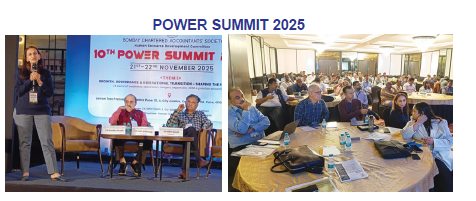
Human Resource Development Committee of BCAS organised a two-day residential program “The Power Summit 2025” on 21 & 22 November 2025 at Hotel Lemon Tree Premier, Pune. This was the 10th season of the Power Summit with the first one being held in 2011.
The theme for the Power Summit was Growth, Governance & Generational Transition – Shaping The Firms of 2030. The Power Summit hosted about 95 participants coming from cities across the country. There were certain participants who had been part of all the previous ninePower Summits as well as participants attending for the first time. This diversity added to the charm of the Summit.
The presentation and panel discussions over the two days were creative, intriguing, and interwoven in a manner that left all participants with valuable insights and a renewed determination to progress along their growth trajectory.
A brief snapshot of the presentation and panel discussions is as follows:
| Topic | Speaker / Panellist & Moderator |
Key Learnings for Participants |
| Grow In Continuum: Succession Planning Strategies
for Proprietorship & Small Firms |
CA Jayraj Sheth | Participants learnt from Jayraj’s presentation about key areas such as exploring when to begin succession planning, grooming successors and client transition strategies. |
| Partnership Deeds – Beyond the Fine Print,
ICAI – Latest Updates.
|
Speaker: CA Vishal Doshi | Moderator: CA Ameet Patel | Candid discussion with Vishal gave insights into how ICAI, at institution level, is perceiving and looking at mergers, multi-disciplinary partnerships etc. Also, Vishal shared updates on the latest progress happening at ICAI level on these topics. |
| Fireside Chat: Women in Leadership: The Evolving Role
of Women Professional
|
Speaker: CA Priti Savla | Moderator: CA Nandita Parekh | The chat highlighted the various initiatives taken by ICAI for empowering Women Professionals. Also, the personal journey of Priti, motivated and inspired all the participants. |
| Mergers and Expansion –
Why some work, why many fail
|
Panellists: CA Manish Sampat, CA Naman Shrimal | Moderator: CA Vaibhav Manek | The power packed discussion with the panellists left the participants with lots of food for thought on various merger models, geographic / vertical expansion, profit-sharing agreements, reasons for things not working out and practical suggestions on how to navigate these challenges. |
| Practice Excellence- Preparing For Growth/ Merger | Panellists: CA Paresh Shaparia, CA Subhash Saraf | Moderator: CA Ameet Patel | The practical experience shared by both the panellists gave interesting insights to all participants on how to get oneself or one’s own firm ready for Growth and Merger. Key takeaways being around areas of practice reviews, policy documentation, MIS systems etc. |
| Professional Firms @ 2030
What will it take?
|
Panellists: CA Nilesh Vikamsey, CA Naman Shrimal | Moderator: CA Vaibhav Manek | The panellists shared multiple perspectives on what would be the key drivers for a successful CA Firm in 2030. Also, they shared interesting suggestions on future-proofing professional firms in the next decade. |
| Legal Insights on the Professional Service Firms – How to Navigate the Regulatory Landscape and Prepare for Risks and Liabilities | Panellists: Mr. Shreyas Jayasimha, Ms. Radhika Iyer | Moderator: Vaibhav Manek | It was an interesting panel discussion to provide a flavour to all the participants on the kind of legal risks that a professional is carrying in today’s time and practical suggestions on ways to navigate them. There was also discussion on how different professionals can collaborate to create a win-win situation for everyone. |
| Walk & Talk: Challenges of Firm Growth | CA Nilesh Vikamsey, CA Ameet Patel, CA Nandita Parekh | This was the concluding session in which the discussions focused on real-world barriers in expansion and how peers have navigated them. Interesting Q&As and discussions were done with the participants as well. |
The Summit successfully generated substantial interest among the participants, thereby motivating them to strategically plan for their growth. The participants expressed their profound gratitude to the organising team for their exceptional work and the provision of a high-quality program. All participants shared their testimonials and gratitude via WhatsApp groups and social media platforms.
11. Direct Tax Laws Study Circle Meeting on Succession Planning from a Direct Tax Perspective held on 20th November, 2025@ Virtual.
Succession planning plays a vital role in ensuring smooth intergenerational transfer of wealth and preventing disputes. The session highlighted key tax provisions, legal mechanisms, and practical considerations in designing an effective succession structure.
The following major areas were discussed during the session:
- Succession Modes – Wills, trusts, nominations, and family arrangements are the primary structuring options, each carrying different tax outcomes.
- Legal Representative Liability – Responsibility of Legal heirs with respect to tax liabilities of the deceased, including interest and penalty till the date of death.
- Taxation of Executors [S. 168] – Separate assessment of the executor on the income of the estate until its complete distribution.
- Nominee vs. Legal Heirs – The difference between the two was highlighted with an example of a judgment of the Supreme Court in the case of Shakti Yezdani, wherein it was held that a nominee merely facilitates transmission and does not override the rights of legal heirs.
- Will-based transfers – Tax Neutrality – transfers under a Will are not regarded as a “transfer” under Section 47(iii), and inheritance is specifically exempt under Section 56(2)(x). Thus, passing assets through a Will is a tax-efficient mechanism.
- Family Arrangements – Not a Transfer – The session clarified that a genuine family settlement based on antecedent rights is not treated as a transfer for capital gains. It simply realigns existing rights in property to preserve peace and prevent litigation within the family.
- Situations wherein Family Settlements become taxable – The session clarified that If parties lack pre-existing rights—as in P.P. Mahatme (Bom HC)—payments received may be treated as taxable capital gains. Antecedent rights are therefore key to determining tax neutrality.
- Specific vs. Discretionary Trusts – The speaker clarified that certain trusts have identifiable beneficiaries with defined shares, while discretionary trusts allow trustees to decide distributions. Discretionary trusts are generally taxed at the maximum marginal rate unless specific exceptions apply.
Conclusion: The session was highly interactive, with participants actively engaging and gaining practical clarity on the tax and legal aspects of succession planning. The discussions helped simplify complex concepts and gave attendees a clear understanding of how to apply the right tools in real-life situations. Overall, the audience left with valuable insights to plan succession more confidently and effectively.
12. Felicitation of Chartered Accountancy pass-outs of the September 2025 Batch held on Monday, 17th November, 2025@ Sydenham College
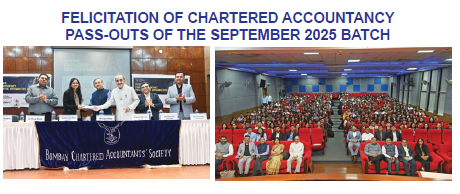
The Seminar, Membership and Public Relations (SMPR) Committee hosted a felicitation ceremony on 17th November 2025 in the auditorium of the Sydenham College of Commerce & Economics, Churchgate, to honour the newly qualified Chartered Accountants from the September 2025 batch. Out of the 450 registrations, over 325 enthusiastic newly qualified CAs participated in the event. The guest and mentor for the event was CA (Adv.) Kinjal Bhuta, Treasurer of BCAS. In her address, she reminisced about her early days, the support she received from her clientele and elders in the profession, and how her association with BCAS has helped in shaping her career and growth as a professional. She shared six life lessons with the audience and invited them to come within the BCAS fold and partake of the bouquet on offer.
AIR 16, Nidhish Naik, AIR 28 Ansh Bhorawat, AIR 34 Naman Gupta and AIR 46 Anjali Shukla were then felicitated. A celebratory cake was cut post which all the other newly passed CAs were felicitated. The ceremony served as a warm welcome of the newly qualified CAs into the wider professional fraternity.
Scan to watch online on Youtube

13. ITF Study Circle meeting – Black Money Act – Penalty for Non-Disclosure of Foreign Assets: Key Rulings held on 14th November, 2025@ Virtual.
The International Tax and Finance Study Circle organized a meeting (online) on 14 November 2025 to discuss key rulings with respect to penalty for non-disclosure of foreign assets under the Black Money Act:
Chairman of the session – CA Sushil Lakhani
Group Leader CA Kush Vatsaraj
- The session opened with the initial remarks from the chairman on the topic.
- Post that, the group leader discussed the rationale of the Black Money Act and the basic provisions to set the context for the group.
- Next the group leader discussed a number of rulings with respect to levy of penalty under the Black Money Act, including rulings under other laws but applicable to penalty under the Black Money Act.
- The group leader discussed a recent Special Bench ruling with respect to the penalty being discretionary in greater detail
- The participants debated various nuances with respect to the levy of penalty under the Black Money Act, especially with respect to some divergent views adopted by appellate authorities.
- The group leader took the group through a number of scenarios with respect to the levy of penalty under the Black Money Act and shared his insights on the same. The chairman of the session also shared his insights.
- The session closed with the floor being opened up for Q & A. Participants raised a number of questions and the same were answered by the group leader and the chairman of the session. Other participants also shared their practical experiences.
14. BCAS NXT – Learning & Development Bootcamp – A Deep Dive into GST Annual Return (GSTR-9) and Reconciliation Statement (GSTR -9C) held on 14th November, 2025@ Virtual.
The bootcamp was held in person at Gokhale & Sathe Chartered Accountants and was also streamed online, with active participation from students across India.
More than 250 students benefited from this session.
Scan to watch online on Youtube

15. Finance, Corporate & Allied Laws Study Circle – Financial Wellness for Professionals held on Thursday, 13th November 2025 @ Virtual
The session on “Financial Wellness for Professionals” by Mr Tarun Birani focused on helping high-earning professionals move from income dependence to true wealth independence through structure and discipline. Using interactive polls and case studies, he highlighted how lifestyle inflation, safety bias and scattered assets often keep professionals financially vulnerable despite strong incomes.
Tarun introduced a clear Wealth Allocation Framework, classifying assets into safety, stability and aspirational buckets, and showed how goal-based cash flows, risk assessment and stress testing can convert affluence into resilient, long-term wealth. He emphasised the power of disciplined equity allocation, behaviour management and periodic rebalancing over market prediction or product selection.
Through real-life client stories, he demonstrated the dangers of concentration in business / profession and real estate, lack of liquidity buffers and poor succession planning, and contrasted this with the benefits of structured family wealth architectures and family offices.
The session concluded with practical action points for professionals to document their finances, separate business and personal wealth, and work with fiduciary, conflict-free advisors to achieve financial wellness with peace of mind.
16. Half-Day Panel Discussions on Transfer Pricing Benchmarking and Compliances held on Friday, 10th October 2025 @ Virtual
The Society successfully conducted its Half-Day Panel Discussions on Transfer Pricing Benchmarking and Compliances via an online platform on Friday, 10th October, 2025 from 2:00 pm to 6:30 pm.
Based on participants’ feedback and consultation with seniors in the Committee, this year BCAS has come up with unique concept of sharing the recordings of the transfer pricing workshop undertaken in October 2023 along with recordings of panel discussions conducted in October 2024 to the participants as pre-reading for the workshop followed by two live panel discussions to take forward the learnings by discussing the intricate and practical issues on transfer pricing making the same more interactive. Details of these two live panel discussions:
| Session | Topic | Panel Members/ Faculties |
| 1 | Panel Discussion on Indian TP Compliance – Beyond Documentation, Towards Value Creation | Moderator – CA Anjul Mota Panelists- CA Namrata Dedhia, CA Naman Shrimal and CA Stuti Trivedi |
| 2 | Panel Discussion on Burning Issues in Indian TP – From Litigation to Strategic Risk Management | Chairman cum Moderator – CA Vispi Patel Panelists- CA Bhavesh Dedhia, CA Suchint Majmudar and CA Vijay Iyer |
Participants were also provided an option to share the queries or issues to the panellists by way of Google form before the respective panel discussion which the panellists addressed during the panel discussion. Eminent tax professionals of the country were the panelists as well as moderator for such panel discussions.
Both the live sessions including the recorded sessions covered all the concepts of Transfer Pricing under the Income Tax Act, 1961 and the other relevant provisions.
More than 54 Participants from 15 states spread over 30 cities attended these live panel discussions which was well-received and appreciated by the participants.
Scan to watch online on BCAS Academy

II. REPRESENTATIONS
1. BCAS Seeks Extension for GSTR-9 and GSTR-9C Due to Increased Compliance Complexity
On 11 December 2025, BCAS submitted a representation to the Hon’ble Finance Minister, highlighting challenges in filing GSTR-9 and GSTR-9C for FY 2024-25. Recent notifications have withdrawn long-standing relaxations, increasing compliance complexity. Key concerns include detailed ITC reporting (Table 7), new import reconciliation requirements (Table 8H1), changes in auto-population (Table 8A shifting from GSTR-2A to GSTR-2B), and technical glitches on the GST portal causing mismatches.
For GSTR-9C, withdrawal of turnover reconciliation relaxations and mandatory cross-year ITC reporting have made preparation more onerous. Tight timelines due to dependence on audited financial statements further exacerbate the challenge.
BCAS has requested a three-month extensionfor filing to allow professionals sufficient time to adapt, ensure data accuracy, and avoid inadvertent errors.
Readers can read the full representation by scanning the QR code or visiting our website www.bcasonline.org
QR Code:

III. BCAS OUTREACH
• BCAS Delegation Meets Chief Executive, Indian Banks’ Association
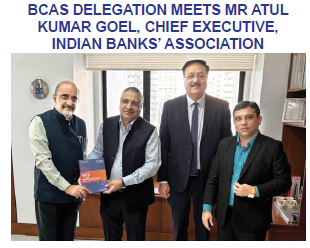
A delegation of BCAS – Bombay Chartered Accountants’ Society, led by CA Zubin Billimoria, President, and CA Kinjal Shah, Vice President, met Mr. Atul Kumar Goel, Chief Executive of the Indian Banks’ Association(IBA).
The delegation briefed Mr. Goel on the key initiatives and activities of BCAS and discussed potential areas of future cooperation between BCAS and IBA.
Mr. Daljit Dogra, Board Member of IBA and Managing Director of Zoroastrian Cooperative Bank, was also present and facilitated the interaction.
BCAS looks forward to a long-term and mutually beneficial professional association with the Indian Banks’ Association.
• Meeting of Office Bearers with Mr. Sudhir Hirdekar, ACP Crime Branch, Mumbai Police
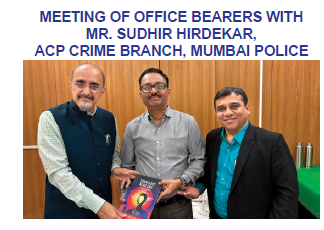
IV. BCAS IN NEWS & MEDIA
- BCAS has been featured in several news and media platforms, showing our active involvement, professional contributions, and commitment to the field. This reflects the growing recognition of BCAS in the public and professional space.
Link: https://bcasonline.org/bcas-in-news/
QR Code:













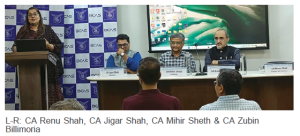
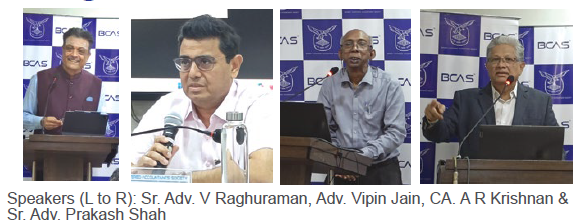

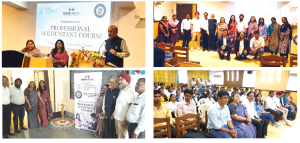
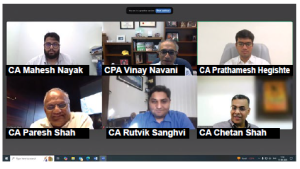






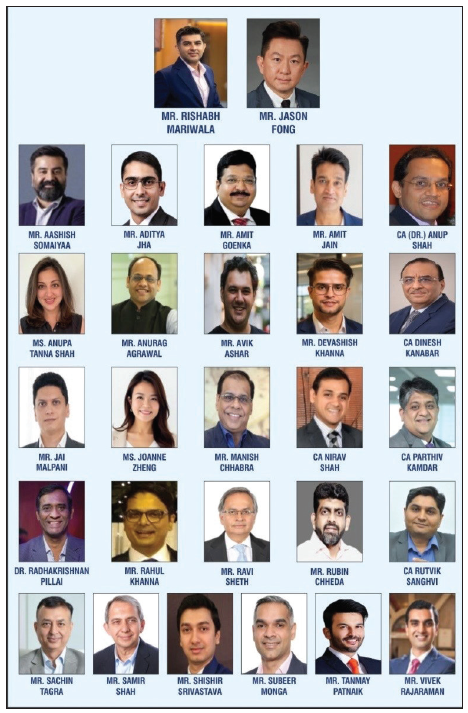
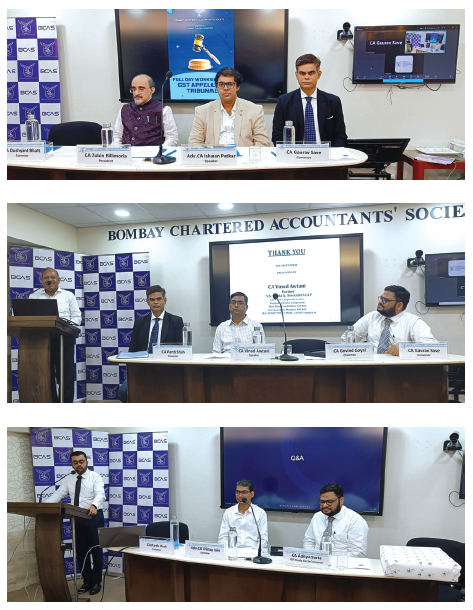
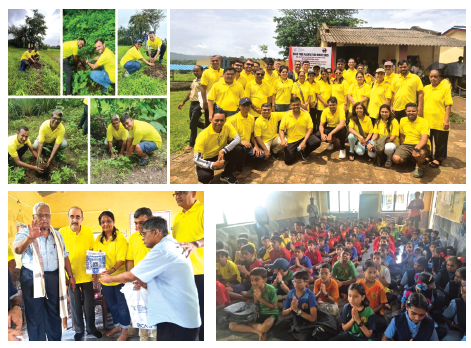
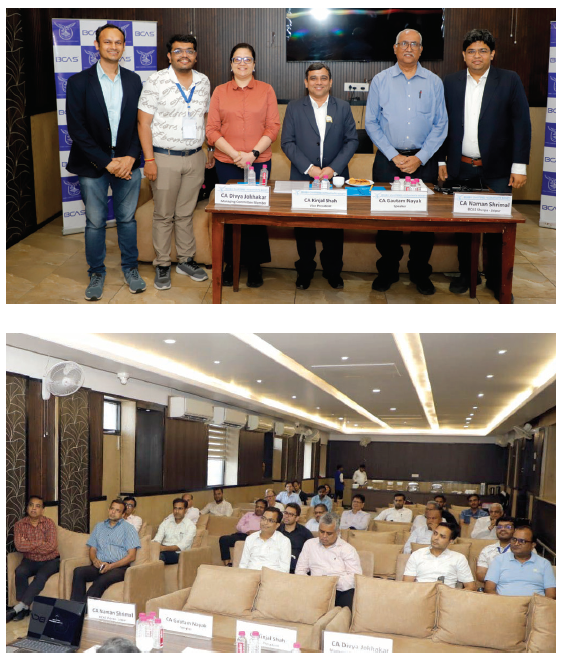
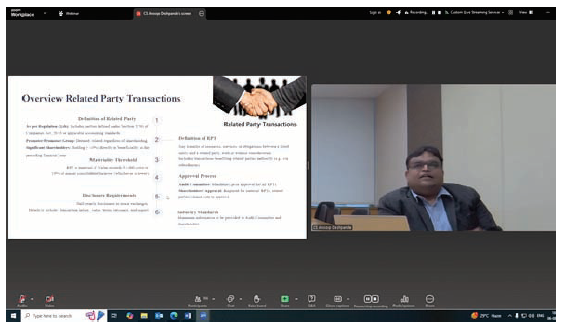


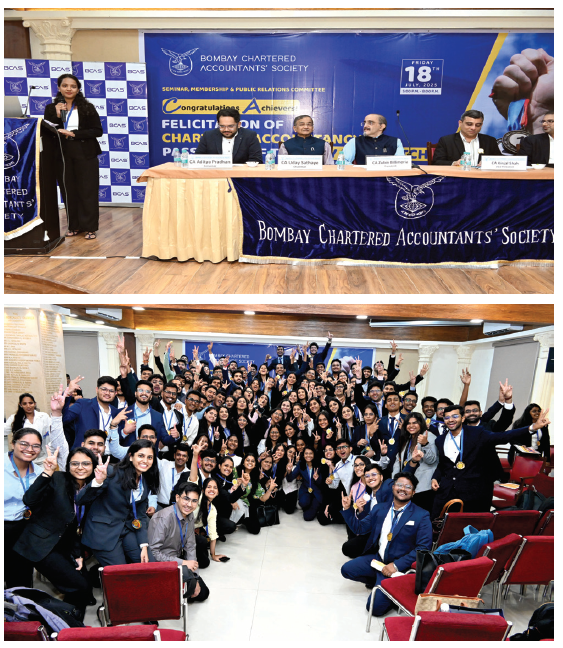
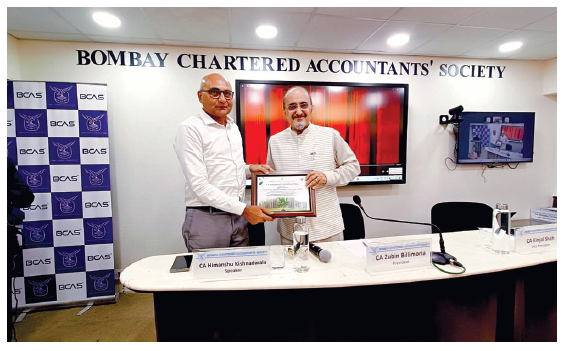

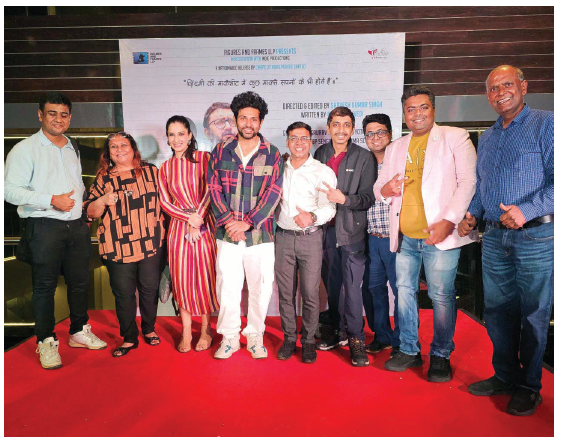
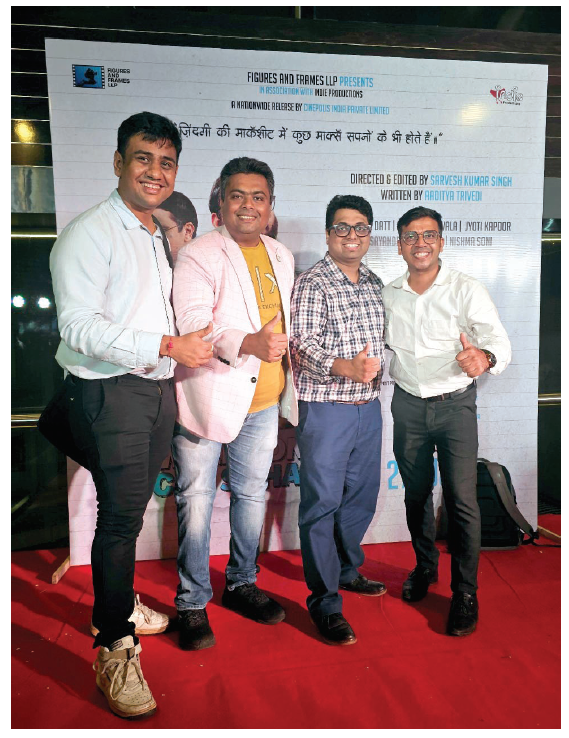

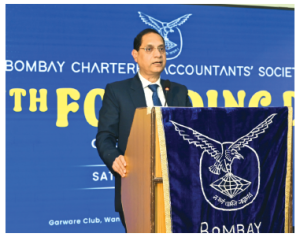
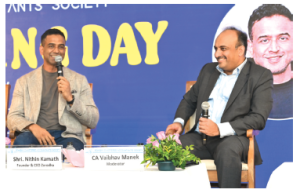
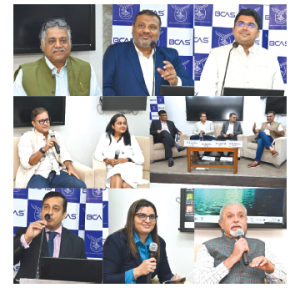
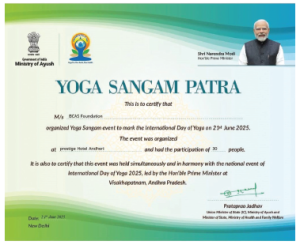

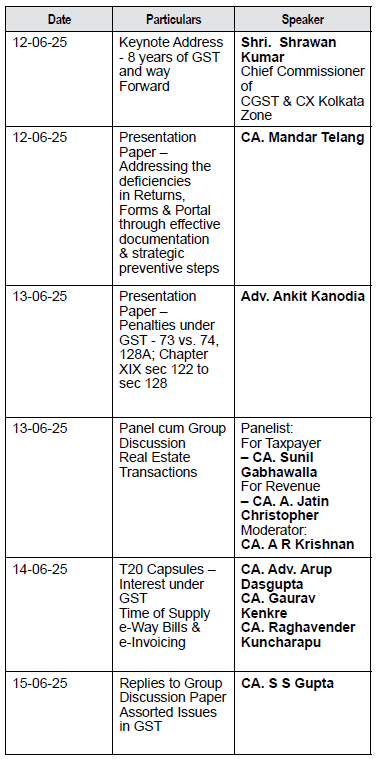
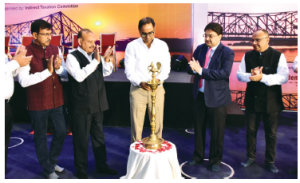
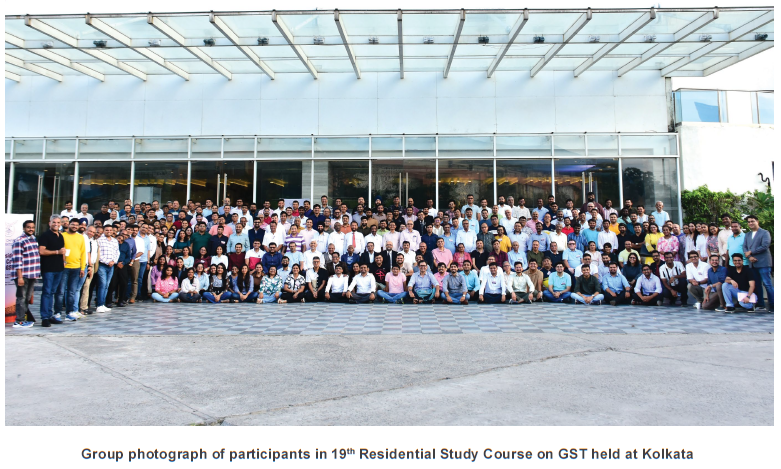
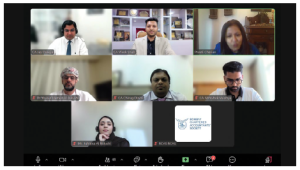

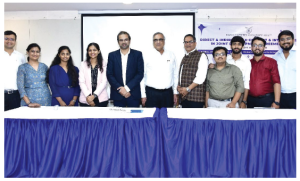
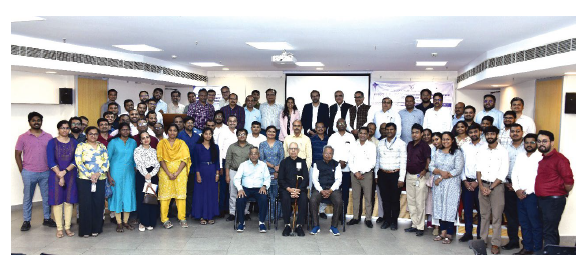


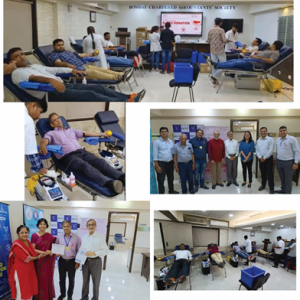




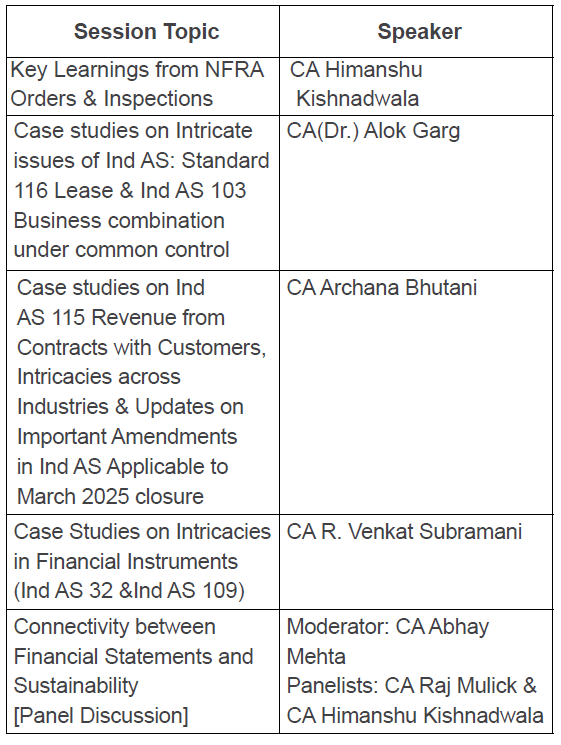




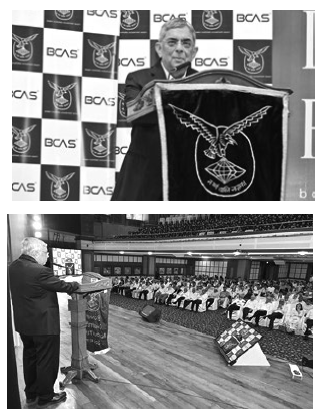

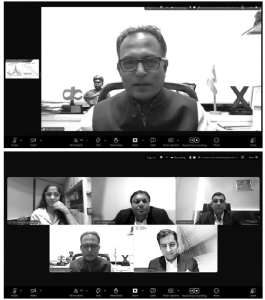







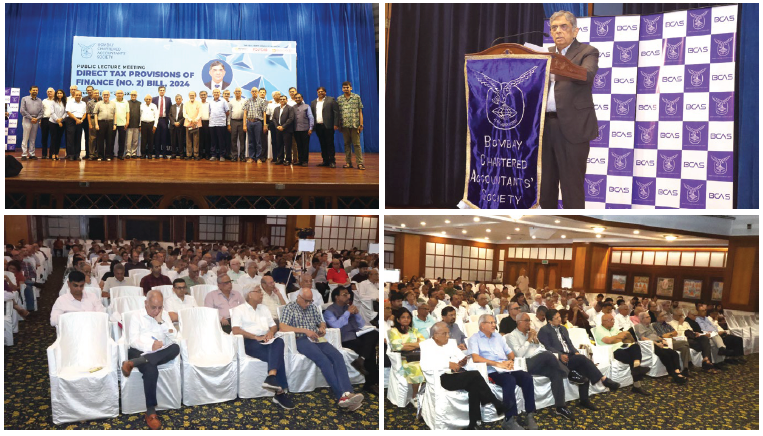

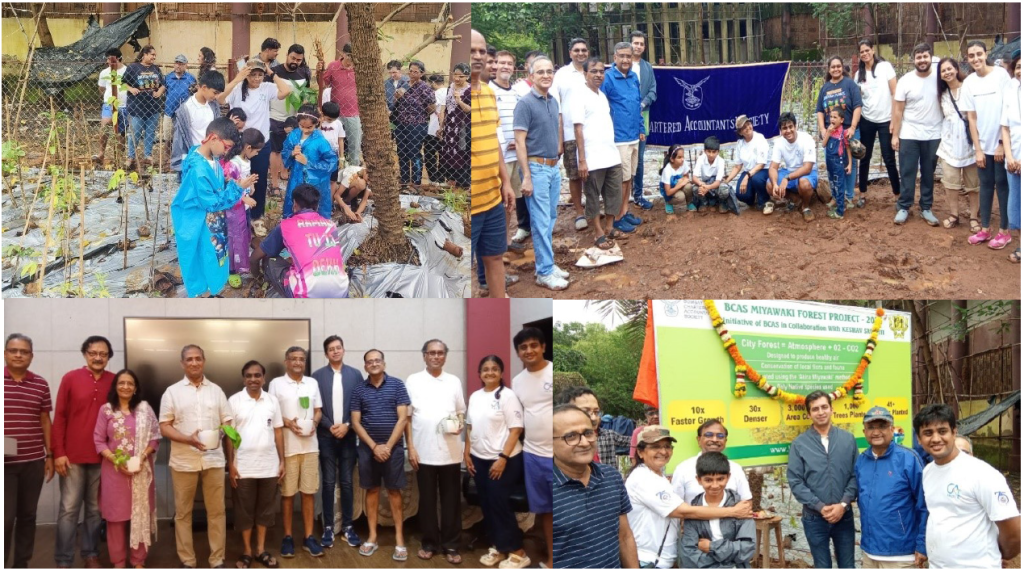
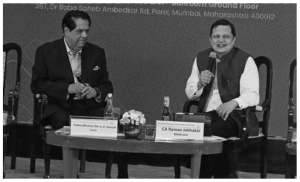


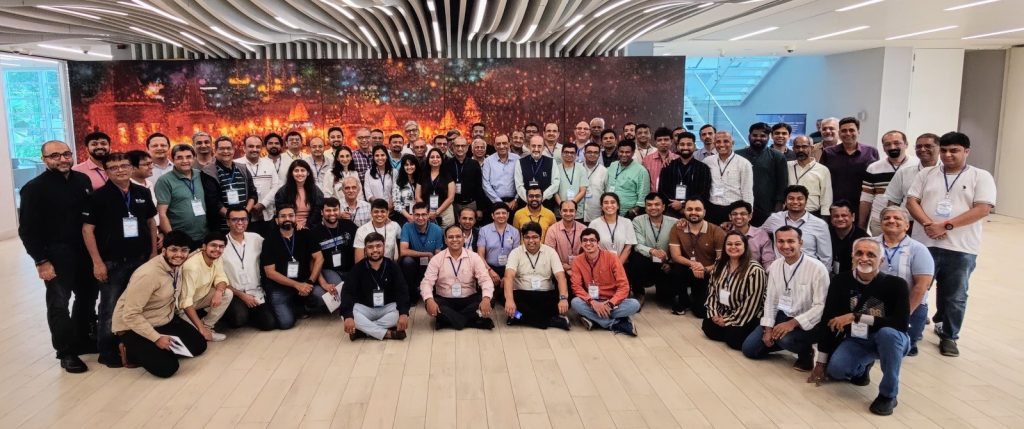




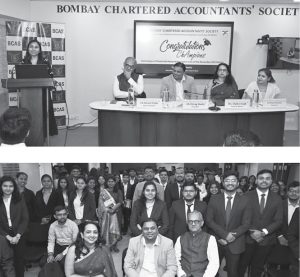












 The workshop held at the Palladium Hotel, Mumbai on August 7th and 8th,
The workshop held at the Palladium Hotel, Mumbai on August 7th and 8th, The Keynote Address at the Conference was given by Shri Sunandan
The Keynote Address at the Conference was given by Shri Sunandan 1. OVERSEAS FUNDS – TA X AND REGULATORY ASPECTS by Shri Bhavin Shah. He dealt with issues relating to taxation of overseas funds and structures for inbound investment by such funds. He also highlighted issues in respect of capital gains on indirect transfers, treaty residence, GAAR, etc. He also provided insights into normal structures of overseas funds.
1. OVERSEAS FUNDS – TA X AND REGULATORY ASPECTS by Shri Bhavin Shah. He dealt with issues relating to taxation of overseas funds and structures for inbound investment by such funds. He also highlighted issues in respect of capital gains on indirect transfers, treaty residence, GAAR, etc. He also provided insights into normal structures of overseas funds.  2. STRUCTURING OF EPC CONTRACTS – TA X & OTHER ISSUES by Shri H. Padamchand Khincha. He highlighted and exhaustively analysed the controversies and issues relating to taxation of various types of EPC contracts, including splitting up of such contracts, treatment of joint ventures, accrual and classification of income from such contracts.
2. STRUCTURING OF EPC CONTRACTS – TA X & OTHER ISSUES by Shri H. Padamchand Khincha. He highlighted and exhaustively analysed the controversies and issues relating to taxation of various types of EPC contracts, including splitting up of such contracts, treatment of joint ventures, accrual and classification of income from such contracts.  3. EXPATRIATE S – TAX AND REGULATORY ASPECTS by Shri Nikhil Bhatia. He analysed the various issues relating to taxation of expatriates, including determination of residential status, deductibility of social security contributions, and treatment of tax equalisation, and also discussed other provisions affecting expatriates, such as provident fund contribution, etc. This was supplemented by various Case Studies involving issues such as transfers, tax efficient method for such transfers, Indian Exchange Control Regulations, Tax Credits, etc.
3. EXPATRIATE S – TAX AND REGULATORY ASPECTS by Shri Nikhil Bhatia. He analysed the various issues relating to taxation of expatriates, including determination of residential status, deductibility of social security contributions, and treatment of tax equalisation, and also discussed other provisions affecting expatriates, such as provident fund contribution, etc. This was supplemented by various Case Studies involving issues such as transfers, tax efficient method for such transfers, Indian Exchange Control Regulations, Tax Credits, etc.  4. PLACE OF EFFECTIVE MANAGEMENT (POEM) by Shri Pinakin Desai, who analysed the meaning of the newly introduced term in the Indian context. He discussed the international perspective and earlier case laws on control and management, and the various factual aspects which would assist in determination of the POEM.
4. PLACE OF EFFECTIVE MANAGEMENT (POEM) by Shri Pinakin Desai, who analysed the meaning of the newly introduced term in the Indian context. He discussed the international perspective and earlier case laws on control and management, and the various factual aspects which would assist in determination of the POEM.  BASE EROSION AND PROFIT SHIFTING (BEPS) – RECENT DEVELOPMENTS by Shri T. P. Ostwal, who covered issues relating to recent developments internationally, and at the OECD. He explained the progress on each of the 15 action points under the BEPS initiative, and the expected timelines within which further actions were to be taken.
BASE EROSION AND PROFIT SHIFTING (BEPS) – RECENT DEVELOPMENTS by Shri T. P. Ostwal, who covered issues relating to recent developments internationally, and at the OECD. He explained the progress on each of the 15 action points under the BEPS initiative, and the expected timelines within which further actions were to be taken. 




























































 The speaker on the subject, Mr. Monish Chatrath gave the audience an overview of the latest developments under Companies Act, which place an onerous responsibility on the auditor. Emphasising their importance, he stressed upon the need to make IFC a powerful and practical tool, in the hands of all the stakeholders – the organisation, the consultant and the auditor.
The speaker on the subject, Mr. Monish Chatrath gave the audience an overview of the latest developments under Companies Act, which place an onerous responsibility on the auditor. Emphasising their importance, he stressed upon the need to make IFC a powerful and practical tool, in the hands of all the stakeholders – the organisation, the consultant and the auditor.  The speaker Mr. R. Ravichandran, Director of Income Tax (Intelligence & Criminal Investigation) explained in detail, the legal framework, procedures and issues involved in the use of Digital Evidence obtained by the Income Tax Department during various stages of assessments, search and seizures.
The speaker Mr. R. Ravichandran, Director of Income Tax (Intelligence & Criminal Investigation) explained in detail, the legal framework, procedures and issues involved in the use of Digital Evidence obtained by the Income Tax Department during various stages of assessments, search and seizures. One day Seminar on BEPS in Action was organised by the International Taxation Committee on 7th November, 2015 at Palladium Hotel in Mumbai.
One day Seminar on BEPS in Action was organised by the International Taxation Committee on 7th November, 2015 at Palladium Hotel in Mumbai.  The Seminar started with CA. Vishal Gada giving an overview of the final deliverables of the OECD on the 15 Action Plans on their Base Erosion and Profit Shifting (BEPS) Project. He gave a detailed summary of the Action Plans. Thereafter, he dealt with the Action Plan on addressing tax challenges in Digital Economy. He informed the audience about the various options that the OECD has suggested to deal with the lack of permanent establishment threshold and indirect taxes issues arising out of e-commerce transactions for source countries. He also summarised some global developments like unilateral actions by countries relating to BEPS during his talk.
The Seminar started with CA. Vishal Gada giving an overview of the final deliverables of the OECD on the 15 Action Plans on their Base Erosion and Profit Shifting (BEPS) Project. He gave a detailed summary of the Action Plans. Thereafter, he dealt with the Action Plan on addressing tax challenges in Digital Economy. He informed the audience about the various options that the OECD has suggested to deal with the lack of permanent establishment threshold and indirect taxes issues arising out of e-commerce transactions for source countries. He also summarised some global developments like unilateral actions by countries relating to BEPS during his talk.  In the subsequent session, action plans relating to substance issues arising in the transfer pricing field were taken up by CA. Sanjay Tolia. He dealt with value creation in case of intangibles, as regards risks and capital and high risk transactions. He also explained the new documentation requirement for country-by-country reporting with master file and country files.
In the subsequent session, action plans relating to substance issues arising in the transfer pricing field were taken up by CA. Sanjay Tolia. He dealt with value creation in case of intangibles, as regards risks and capital and high risk transactions. He also explained the new documentation requirement for country-by-country reporting with master file and country files.  Mr. S.P. Singh, IRS, dealt with the action plans dealing with the issues of transparency and certainty. These action plans related to establishing methodologies to collect and analyse data on BEPS, requiring taxpayers to disclose their aggressive tax planning arrangements, making Dispute Resolution mechanism more effective and developing a Multilateral Instrument to effectively implement the action plans.
Mr. S.P. Singh, IRS, dealt with the action plans dealing with the issues of transparency and certainty. These action plans related to establishing methodologies to collect and analyse data on BEPS, requiring taxpayers to disclose their aggressive tax planning arrangements, making Dispute Resolution mechanism more effective and developing a Multilateral Instrument to effectively implement the action plans.  In the final session, CA T. P. Ostwal updated the participants about the current developments like the ‘Google tax’ and reporting on aggressive planning techniques by taxpayers and other related developments in India and globally.
In the final session, CA T. P. Ostwal updated the participants about the current developments like the ‘Google tax’ and reporting on aggressive planning techniques by taxpayers and other related developments in India and globally.  The speaker, CA. Rohan Phatarphekar shared with the audience, his views on the recent development and controversies in Transfer Pricing. He gave a brief overview on the application and interpretation of these recent developments. He emphasised on the issues involved and the approach of the revenue for these controversies and discussed the same in details.
The speaker, CA. Rohan Phatarphekar shared with the audience, his views on the recent development and controversies in Transfer Pricing. He gave a brief overview on the application and interpretation of these recent developments. He emphasised on the issues involved and the approach of the revenue for these controversies and discussed the same in details.  A full day seminar on “Charitable Trusts” was organised jointly with The Chamber of Tax Consultants. The objective of the seminar was to enlighten the participants with the entire aspects and procedures for formation, running rules, regulations, investments and taxation of Charitable Trusts with special emphasis on the updated laws and CSR provisions.
A full day seminar on “Charitable Trusts” was organised jointly with The Chamber of Tax Consultants. The objective of the seminar was to enlighten the participants with the entire aspects and procedures for formation, running rules, regulations, investments and taxation of Charitable Trusts with special emphasis on the updated laws and CSR provisions. 




















 The faculty answered the various queries raised by the members which reflected how deeply the audience got interested on the subject. More than 200 members present gained immensely from the expert deliberation from the faculties. The video of the lecture is available at www.bcasonline.org & www.bcasonline.tv, respectively, for the benefit of all.
The faculty answered the various queries raised by the members which reflected how deeply the audience got interested on the subject. More than 200 members present gained immensely from the expert deliberation from the faculties. The video of the lecture is available at www.bcasonline.org & www.bcasonline.tv, respectively, for the benefit of all. 













 The Indirect Tax Committee of the Society conducted a workshop on 12th September 2015 on “How to assess the impact of proposed GST law” on two major business sectors. Mr. Divyesh Lapsiwala dealt with possible impact on pharmaceutical sector. He explained in a very lucid manner and citing various examples as to how the new concepts in GST are likely to impact business processes and distribution models of pharma companies. Parind Mehta demonstrated before members the likely impact of GST on construction sector by discussing a case study. Participants also discussed various legal issues which may crop up while solving the case study.
The Indirect Tax Committee of the Society conducted a workshop on 12th September 2015 on “How to assess the impact of proposed GST law” on two major business sectors. Mr. Divyesh Lapsiwala dealt with possible impact on pharmaceutical sector. He explained in a very lucid manner and citing various examples as to how the new concepts in GST are likely to impact business processes and distribution models of pharma companies. Parind Mehta demonstrated before members the likely impact of GST on construction sector by discussing a case study. Participants also discussed various legal issues which may crop up while solving the case study.  Mr. Yogesh Thar addressed the august gathering on “ICDS: Overview and Challenges in Application”. The highlights of his talk are summarised below:
Mr. Yogesh Thar addressed the august gathering on “ICDS: Overview and Challenges in Application”. The highlights of his talk are summarised below:

 Lecture Meeting on Important Income-tax Decisions of 2014 on 29th January 2015
Lecture Meeting on Important Income-tax Decisions of 2014 on 29th January 2015


 Programme on Real Estate Investment Trusts (REITs) & Infrastructure Investment Trusts (InvITs) on 7th February 2015
Programme on Real Estate Investment Trusts (REITs) & Infrastructure Investment Trusts (InvITs) on 7th February 2015

















 The Human Resources Committee of BCAS organised a workshop (spread over four Saturdays), under the auspices of Amita Memorial Trust, where the Trainer, Mr. Shyam Lata dealt with various aspects of enhancing public speaking, communication and interpersonal skills. These four sessions helped the participants overcome limiting inhibitions. He guided them to develop a compelling desire, not only to express one’s ideas but to do so with conviction and assertion. 27 participants attended the workshop. They immensely benefited from the training.
The Human Resources Committee of BCAS organised a workshop (spread over four Saturdays), under the auspices of Amita Memorial Trust, where the Trainer, Mr. Shyam Lata dealt with various aspects of enhancing public speaking, communication and interpersonal skills. These four sessions helped the participants overcome limiting inhibitions. He guided them to develop a compelling desire, not only to express one’s ideas but to do so with conviction and assertion. 27 participants attended the workshop. They immensely benefited from the training.































 ESI, Bonus & Gratuity Act, Shop and Establishment Act:-
ESI, Bonus & Gratuity Act, Shop and Establishment Act:- A
A
 The
The Every year, the most awaited event is the budget. What the Finance Minister unfolded on 29th February 2016 with respect to the direct tax provisions was covered in the Public Lecture Meeting held on 4th March 2016 by Senior Advocate Mr. S. E. Dastur. This was the 51st Budget Lecture Meeting of the Society and 28th year of address by Mr. S. E. Dastur. This year the Society has captured pre budget expectations and post budget inteviews from the stalwarts and the youth. Just before the lecture began, a series of views of various people on the budget were taken by Mr. Ameet Patel. All these videos are available on our website as well as Youtube channel and also on social media.
Every year, the most awaited event is the budget. What the Finance Minister unfolded on 29th February 2016 with respect to the direct tax provisions was covered in the Public Lecture Meeting held on 4th March 2016 by Senior Advocate Mr. S. E. Dastur. This was the 51st Budget Lecture Meeting of the Society and 28th year of address by Mr. S. E. Dastur. This year the Society has captured pre budget expectations and post budget inteviews from the stalwarts and the youth. Just before the lecture began, a series of views of various people on the budget were taken by Mr. Ameet Patel. All these videos are available on our website as well as Youtube channel and also on social media. President Raman Jokhakar welcomed the speaker, Senior Advocate Mr. Vikram Nankani, an eminent speaker on the subject to throw light on the amendments of the changes by the Finance bill 2016.The lecture meeting commenced with the launch of the new publication of the Society “Partnership Firms – Registration Procedure and Frequently Faced Issues with Registrar of Firms” by Mr. Uday Sathaye, Past President of the Society. The book was launched by the speaker Mr. Nankani.
President Raman Jokhakar welcomed the speaker, Senior Advocate Mr. Vikram Nankani, an eminent speaker on the subject to throw light on the amendments of the changes by the Finance bill 2016.The lecture meeting commenced with the launch of the new publication of the Society “Partnership Firms – Registration Procedure and Frequently Faced Issues with Registrar of Firms” by Mr. Uday Sathaye, Past President of the Society. The book was launched by the speaker Mr. Nankani.  Professionals like CA’s, Advocates, Businessmen are finding it difficult to Register Partnership Firms with Registrar of Firms in Maharashtra due to various issues. This process of registration involves submission of documents and the careful adherence to a procedure which has been laid down.
Professionals like CA’s, Advocates, Businessmen are finding it difficult to Register Partnership Firms with Registrar of Firms in Maharashtra due to various issues. This process of registration involves submission of documents and the careful adherence to a procedure which has been laid down. 
 His address was followed by the interactive session wherein the panel of RBI officers provided views on the written queries provided to them in advance. The queries covered all important areas of FEMA including those dealing with ODI, FDI, LRS, ECB and Trade transactions. The Officers answered the queries and also dealt with several questions from the audience.
His address was followed by the interactive session wherein the panel of RBI officers provided views on the written queries provided to them in advance. The queries covered all important areas of FEMA including those dealing with ODI, FDI, LRS, ECB and Trade transactions. The Officers answered the queries and also dealt with several questions from the audience. The post lunch technical sessions was on “Trade Transactions” by Mr. Shabbir Motorwala who succinctly covered the vast subject in the time available with him. The last session was on “ECBs” wherein Mr. Kumar Saurabh Singh covered the recent amendments in the ECB policy and also dealt with the other financing routes available to borrowers. Both the speakers answered queries from the audience and covered the subjects in significant detail. The Conference was received well by all present.
The post lunch technical sessions was on “Trade Transactions” by Mr. Shabbir Motorwala who succinctly covered the vast subject in the time available with him. The last session was on “ECBs” wherein Mr. Kumar Saurabh Singh covered the recent amendments in the ECB policy and also dealt with the other financing routes available to borrowers. Both the speakers answered queries from the audience and covered the subjects in significant detail. The Conference was received well by all present.  It was once again a proud moment for BCAS and BCAS Foundation to organise a music concert “Udat Abeel Gulal”, together with a few other organisations at Bharatiya Vidya Bhavan on 19th March, 2016 in aid of Dilasa Sanstha, an NGO engaged in relief work for drought affected farmers of Maharashtra. Attended by a large audience, it started with jugalbandi of Santoor and Saraswati Veena by Shri Snehal Muzoomdar, Maithili Muzoomdar on Santoor and Shri Narayan Mani on Saraswati Veena respectively, accompanied by a team of virtuoso musicians and interspersed with Vedic chants by Ved Pandit Dr. Narasimha Ghanpatigal. Explaining the theme “Bairagi se Basant”, Compere Mihir Sheth vividly created background atmosphere for celebration of spring with quotes from Kalidasa and Rig-Veda. Narrating the ethos of the theme and quoting medieval poet Maagh, he said when season of Basant arrives, its enchanting beauty feels us with a sense of bliss, Abeel and Gulal colour our lives, the fire of Holi protects our lives, give us the prosperity and hence, we all invoke Firegod Agni as narrated in Agnisooktam in Rig-Veda whose hymns are often chanted in raga Bairagi.
It was once again a proud moment for BCAS and BCAS Foundation to organise a music concert “Udat Abeel Gulal”, together with a few other organisations at Bharatiya Vidya Bhavan on 19th March, 2016 in aid of Dilasa Sanstha, an NGO engaged in relief work for drought affected farmers of Maharashtra. Attended by a large audience, it started with jugalbandi of Santoor and Saraswati Veena by Shri Snehal Muzoomdar, Maithili Muzoomdar on Santoor and Shri Narayan Mani on Saraswati Veena respectively, accompanied by a team of virtuoso musicians and interspersed with Vedic chants by Ved Pandit Dr. Narasimha Ghanpatigal. Explaining the theme “Bairagi se Basant”, Compere Mihir Sheth vividly created background atmosphere for celebration of spring with quotes from Kalidasa and Rig-Veda. Narrating the ethos of the theme and quoting medieval poet Maagh, he said when season of Basant arrives, its enchanting beauty feels us with a sense of bliss, Abeel and Gulal colour our lives, the fire of Holi protects our lives, give us the prosperity and hence, we all invoke Firegod Agni as narrated in Agnisooktam in Rig-Veda whose hymns are often chanted in raga Bairagi.  The Jugalbandi started with raga Bairagi rendered on Santoor and Saraswati Veena interspersed with chanting of Vedic hymns and then deftly moved on to raga Basant and Kafi, which are the popular ragas of the Basant season, accompanied by vocalists Shraddha Shridharni in Hindustani style and Nupur Joshi in Carnatic style. Both the vocalists recreated magic with their rendition of poet Nanhalal’s poems so ably composed by Snehal Muzoomdar. Fine balance of melodious music with perfect percussion and dramatic entry of vocalists on the stage left the audience completely mesmerised when it reached the crescendo in the end.
The Jugalbandi started with raga Bairagi rendered on Santoor and Saraswati Veena interspersed with chanting of Vedic hymns and then deftly moved on to raga Basant and Kafi, which are the popular ragas of the Basant season, accompanied by vocalists Shraddha Shridharni in Hindustani style and Nupur Joshi in Carnatic style. Both the vocalists recreated magic with their rendition of poet Nanhalal’s poems so ably composed by Snehal Muzoomdar. Fine balance of melodious music with perfect percussion and dramatic entry of vocalists on the stage left the audience completely mesmerised when it reached the crescendo in the end.  The Human Development & Technology Initiative Committee continued with the annual CSR activity of supporting Eye Camp for the tribals and the needy people from the rural area surrounding Vansda, Dist. Navsari.
The Human Development & Technology Initiative Committee continued with the annual CSR activity of supporting Eye Camp for the tribals and the needy people from the rural area surrounding Vansda, Dist. Navsari.  The Committee had set a target of one Eye Camp with a Budget of Rs.51,000/- for cataract surgery of 51 patients. However, with divine grace and kind support of all donor friends, it was able to collect Rs.2,17,200, which can take care of 217 patients i.e. little over four Eye Camps.
The Committee had set a target of one Eye Camp with a Budget of Rs.51,000/- for cataract surgery of 51 patients. However, with divine grace and kind support of all donor friends, it was able to collect Rs.2,17,200, which can take care of 217 patients i.e. little over four Eye Camps. 








 In the first session CA. Mayur Nayak effectively explained, many important points aptly punctuated with humour. He explained the importance of clarity of goal, attitude to win, discipline, consistency, effective time management and how to overcome distractions. He guided them to have Balanced food, effective study and relaxation. He emphasised that harmony of physical, emotional, intellectual and spiritual alignment would help them to face any challenges in life including that of exams.
In the first session CA. Mayur Nayak effectively explained, many important points aptly punctuated with humour. He explained the importance of clarity of goal, attitude to win, discipline, consistency, effective time management and how to overcome distractions. He guided them to have Balanced food, effective study and relaxation. He emphasised that harmony of physical, emotional, intellectual and spiritual alignment would help them to face any challenges in life including that of exams.  In the second session CA. Shrinivas Joshi focused on CA exams. He explained at length as to how to prepare with qualitative studies for exams including use of appropriate reference materials. He shared the information that excellent study materials and faculties are available freely to clarify and guide on a variety of subjects covered in the syllabus. He explained at length as to what the examiner expects from the students and also cleared their doubts on misinformation and wrong impressions in the minds of the students about the ICAI exams and its results. He shared the important tips as to how to write the papers and manage time of three hours in exams. He answered all questions raised by the students.
In the second session CA. Shrinivas Joshi focused on CA exams. He explained at length as to how to prepare with qualitative studies for exams including use of appropriate reference materials. He shared the information that excellent study materials and faculties are available freely to clarify and guide on a variety of subjects covered in the syllabus. He explained at length as to what the examiner expects from the students and also cleared their doubts on misinformation and wrong impressions in the minds of the students about the ICAI exams and its results. He shared the important tips as to how to write the papers and manage time of three hours in exams. He answered all questions raised by the students. 
 The Seminar on Media and Entertainment Industry was conducted by the International Taxation Committee of the BCAS on 12 February 2016 at St. Regis Hotel (Palladium Hotel). This seminar was organized jointly with Accounting & Auditing Committee and Indirect Taxation Committee. The speakers at the seminar and the topics covered were as under:
The Seminar on Media and Entertainment Industry was conducted by the International Taxation Committee of the BCAS on 12 February 2016 at St. Regis Hotel (Palladium Hotel). This seminar was organized jointly with Accounting & Auditing Committee and Indirect Taxation Committee. The speakers at the seminar and the topics covered were as under:  Mr. Jehil Thakkar on Know the industry – current issues – Business models, cash flows, vehicle for investments, etc. (Industry overview and typical situations)
Mr. Jehil Thakkar on Know the industry – current issues – Business models, cash flows, vehicle for investments, etc. (Industry overview and typical situations) Mr. Utkarsh Sanghvi on Indirect tax issues in media and entertainment industry, including: Service tax, VAT and customs.
Mr. Utkarsh Sanghvi on Indirect tax issues in media and entertainment industry, including: Service tax, VAT and customs.  The seminar was attended by more than 50 participants. The seminar became very informative and provided an overview of industry as a whole and detailed technical analysis on taxation, accounting and auditing aspects. The Seminar provided an insight into the industry and focused on the issues faced in the industry and the current trends in respect of the Media and Entertainment industry. The sessions at this seminar were all interactive and generated good amount of debate among the participants and the presenter.
The seminar was attended by more than 50 participants. The seminar became very informative and provided an overview of industry as a whole and detailed technical analysis on taxation, accounting and auditing aspects. The Seminar provided an insight into the industry and focused on the issues faced in the industry and the current trends in respect of the Media and Entertainment industry. The sessions at this seminar were all interactive and generated good amount of debate among the participants and the presenter.  Lecture Meeting on Important Case Laws of 2015 on Indirect Taxes held on Wednesday, 17th February 2016 at IMC Hall Churchgate Shri. K. Vaitheeswaran dealt with various important case laws of 2015 on Indirect Taxes. He discussed and deliberated upon case laws in the field of Central Excise, Customs, Service Tax and Sales tax. He dealt with intricacies of the cases with an impact analysis.
Lecture Meeting on Important Case Laws of 2015 on Indirect Taxes held on Wednesday, 17th February 2016 at IMC Hall Churchgate Shri. K. Vaitheeswaran dealt with various important case laws of 2015 on Indirect Taxes. He discussed and deliberated upon case laws in the field of Central Excise, Customs, Service Tax and Sales tax. He dealt with intricacies of the cases with an impact analysis.  Lecture Meeting on Important Income Tax Decisions of 2015 was held on Wednesday, 24th February 2016 at the Jaihind College Auditorium.
Lecture Meeting on Important Income Tax Decisions of 2015 was held on Wednesday, 24th February 2016 at the Jaihind College Auditorium. 

 The RSC started in the afternoon with group discussion on the paper titled “Case Studies on Taxation of Services” written by CA A. R. Krishnan. The group leaders were CA Ankit Joshi, CA Anil Kumar Beewada, CA Mandar Telang, CA Manindar Kakarla and CA Nilesh Suchak. Case Studies on taxability of different services and various “live” situations faced by tax advisers on daily basis were articulated. Valuation, Exemption, Point of Taxation and Place of Provision of Service were debated with active participation of all the delegates.
The RSC started in the afternoon with group discussion on the paper titled “Case Studies on Taxation of Services” written by CA A. R. Krishnan. The group leaders were CA Ankit Joshi, CA Anil Kumar Beewada, CA Mandar Telang, CA Manindar Kakarla and CA Nilesh Suchak. Case Studies on taxability of different services and various “live” situations faced by tax advisers on daily basis were articulated. Valuation, Exemption, Point of Taxation and Place of Provision of Service were debated with active participation of all the delegates.  The morning started with the group discussion on the paper “Case Studies on CENVAT Credit” written by CA S. S. Gupta. The group leaders were CA Ganesh Prabhu Balakumar, CA Keval Shah, CA Shreyas Sangoi, CA Shruti Kakaria and CA Vaibhav Jajoo. The issues were debated since most of the issues had a variety of angles involved and had day-today relevance.
The morning started with the group discussion on the paper “Case Studies on CENVAT Credit” written by CA S. S. Gupta. The group leaders were CA Ganesh Prabhu Balakumar, CA Keval Shah, CA Shreyas Sangoi, CA Shruti Kakaria and CA Vaibhav Jajoo. The issues were debated since most of the issues had a variety of angles involved and had day-today relevance.  The second technical session was a presentation paper by CA Divyesh Lapsiwala on “Indirect Tax Benefits in Foreign Trade Policy”. In his inimitable style, he briefly explained the five most common schemes of the Government’s Foreign Trade Policy which can benefit the exporters i.e. (a) Export Promotion Capital Goods Scheme (b) Services Exports from India Scheme (c) Status Holders (d) Software Technology Park Scheme and (e) Special Economic Zone Scheme. This session was chaired by CA Hasmukh Kamdar.
The second technical session was a presentation paper by CA Divyesh Lapsiwala on “Indirect Tax Benefits in Foreign Trade Policy”. In his inimitable style, he briefly explained the five most common schemes of the Government’s Foreign Trade Policy which can benefit the exporters i.e. (a) Export Promotion Capital Goods Scheme (b) Services Exports from India Scheme (c) Status Holders (d) Software Technology Park Scheme and (e) Special Economic Zone Scheme. This session was chaired by CA Hasmukh Kamdar.  The last paper for Group Discussion was written by by CA Parind Mehta on “Case Studies on Sale v/s Service – Composite Transactions (Taxability under VAT and Service Tax)”. The Group Leaders were CA Chirag Mehta, CA Samir Kapadia, CA Sanjay Dhariwal, CA Vikram Mehta and CA Yash Dhadda. The case studies highlighted certain very relevant issues which a transaction could have and were probably not even envisaged by many participants.
The last paper for Group Discussion was written by by CA Parind Mehta on “Case Studies on Sale v/s Service – Composite Transactions (Taxability under VAT and Service Tax)”. The Group Leaders were CA Chirag Mehta, CA Samir Kapadia, CA Sanjay Dhariwal, CA Vikram Mehta and CA Yash Dhadda. The case studies highlighted certain very relevant issues which a transaction could have and were probably not even envisaged by many participants.  During the fourth technical session, CA Sagar Shah presented a paper on “Role of CAs in GST – Realignment Requirements”. A very crisp and brief analysis of how as a professional we need to gear up for the challenges as well as opportunities this new law will generate for Chartered Accountants. This session was chaired by CA Sunil Gabhawalla.
During the fourth technical session, CA Sagar Shah presented a paper on “Role of CAs in GST – Realignment Requirements”. A very crisp and brief analysis of how as a professional we need to gear up for the challenges as well as opportunities this new law will generate for Chartered Accountants. This session was chaired by CA Sunil Gabhawalla.  BCAS organised a lecture meeting on 29-6-2016 on the Model GST Law at IMC. At a juncture when the fate of the 122nd Constitutional Amendment Bill is yet to be known and everyone is waiting for its passage in this monsoon session of the Parliament, on 14-06-02016, the Model GST Law was placed in the public domain by the government after the nod of the Empowered Committee. Shri Shailesh Sheth gave wonderful insights on the model law. The views of the speaker on the Model GST Law were commendable and a guiding force for all. The speaker in a nutshell described to the members present the various provisions of the model law and how the model law has been drafted as a mixture of the existing indirect tax laws like State Level VAT , Central Excise and Service tax. The meeting received an overwhelming response with the venue packed with around 250 audience.
BCAS organised a lecture meeting on 29-6-2016 on the Model GST Law at IMC. At a juncture when the fate of the 122nd Constitutional Amendment Bill is yet to be known and everyone is waiting for its passage in this monsoon session of the Parliament, on 14-06-02016, the Model GST Law was placed in the public domain by the government after the nod of the Empowered Committee. Shri Shailesh Sheth gave wonderful insights on the model law. The views of the speaker on the Model GST Law were commendable and a guiding force for all. The speaker in a nutshell described to the members present the various provisions of the model law and how the model law has been drafted as a mixture of the existing indirect tax laws like State Level VAT , Central Excise and Service tax. The meeting received an overwhelming response with the venue packed with around 250 audience.  Mr. Yogesh Thar explained the important features of The Direct Tax Dispute Resolution Scheme, 2016 and Equalisation Levy. . He further discussed the provisions related to special rate of tax for certain companies under Section 115BA and Section 115 BBDA dealing with additional 10% tax on dividends in the hands of recipient. He also brought out various issues arising out of the above amendments and answered the queries of the participants.
Mr. Yogesh Thar explained the important features of The Direct Tax Dispute Resolution Scheme, 2016 and Equalisation Levy. . He further discussed the provisions related to special rate of tax for certain companies under Section 115BA and Section 115 BBDA dealing with additional 10% tax on dividends in the hands of recipient. He also brought out various issues arising out of the above amendments and answered the queries of the participants. Mr. Rajesh Kadakia started his talk by highlighting the amendments relating to charitable institutions. He explained the intention and rationale behind the said changes and highlighted the effects of the same for the existing charitable institutions and their activities. He gave an insight into the provisions relating to Immovable Properties (Sec. 50C), Capital Gains related provisions and deduction of profits from housing projects of affordable residential units – Sec. 80IBA etc.
Mr. Rajesh Kadakia started his talk by highlighting the amendments relating to charitable institutions. He explained the intention and rationale behind the said changes and highlighted the effects of the same for the existing charitable institutions and their activities. He gave an insight into the provisions relating to Immovable Properties (Sec. 50C), Capital Gains related provisions and deduction of profits from housing projects of affordable residential units – Sec. 80IBA etc.  Mr. Praful Poladia started with case studies highlighting the amendments to Presumptive Taxation for persons engaged in business and profession and related provisions i.e. tax audit and maintenance of books of account. He also gave detailed examples in relation to amendments to buyback of shares and how it affects business structuring. He explained to the participants the new Income Declaration Scheme, 2016 and took them through three sets of clarifications issued by CBDT on the Scheme.
Mr. Praful Poladia started with case studies highlighting the amendments to Presumptive Taxation for persons engaged in business and profession and related provisions i.e. tax audit and maintenance of books of account. He also gave detailed examples in relation to amendments to buyback of shares and how it affects business structuring. He explained to the participants the new Income Declaration Scheme, 2016 and took them through three sets of clarifications issued by CBDT on the Scheme.  Ms. Sonalee Godbole gave a detailed presentation on amendments in relation to penalties (with special reference to sec. 270A), Chapter VI-A deductions, provisions relating to Income from Business & Profession (other than Presumptive Taxation), Income from Salary, Income from House Property and TDS provisions. The speaker touched upon a wide number of judgments during the course of her talk. She also answered all the questions raised by the participants.
Ms. Sonalee Godbole gave a detailed presentation on amendments in relation to penalties (with special reference to sec. 270A), Chapter VI-A deductions, provisions relating to Income from Business & Profession (other than Presumptive Taxation), Income from Salary, Income from House Property and TDS provisions. The speaker touched upon a wide number of judgments during the course of her talk. She also answered all the questions raised by the participants.  There was also a session on Income Declaration Scheme, 2016 where the Principal CCIT Mr D. S. Saksena along with Pr. CIT – 1 Mr. D.C. Patwari addressed the participants about the features and procedural aspects of the said Scheme. They also answered the queries raised by the participants and were receptive to the clarifications sought by them. They told that the issues where clarifications are necessary would be forwarded to the CBDT for further clarification. They also asked the participants to make their clients aware of the scheme and assured that the details provided by assesse under the scheme would be kept confidential. Mr Patwari also briefly spoke about the Dispute Resolution Scheme, 2016.
There was also a session on Income Declaration Scheme, 2016 where the Principal CCIT Mr D. S. Saksena along with Pr. CIT – 1 Mr. D.C. Patwari addressed the participants about the features and procedural aspects of the said Scheme. They also answered the queries raised by the participants and were receptive to the clarifications sought by them. They told that the issues where clarifications are necessary would be forwarded to the CBDT for further clarification. They also asked the participants to make their clients aware of the scheme and assured that the details provided by assesse under the scheme would be kept confidential. Mr Patwari also briefly spoke about the Dispute Resolution Scheme, 2016.  The sessions in the Seminar were very interactive and the speakers answered a lot of queries that were received from the participants. The participants benefited immensely with the interactive sessions and detailed discussions with the speakers and Income Tax Department Officials. The event saw attendance by over 100 participants.
The sessions in the Seminar were very interactive and the speakers answered a lot of queries that were received from the participants. The participants benefited immensely with the interactive sessions and detailed discussions with the speakers and Income Tax Department Officials. The event saw attendance by over 100 participants.  He explained that the growth both in business and profession has to result in profits for associates, shareholders and stakeholders. He gave examples as to how he faced the key challenges in achieving and sustaining growth in his company which filters from top to bottom.
He explained that the growth both in business and profession has to result in profits for associates, shareholders and stakeholders. He gave examples as to how he faced the key challenges in achieving and sustaining growth in his company which filters from top to bottom.  Further, the speaker took through the journey of Marico which was a family run business and how it was modelled to bring about value principles and policies to bring expansion and growth. He talked about his journey of culture building in the organization through involvement of its people and seeking commitment from them. He also emphasized the need of quarter to quarter performance to measure topline and bottomline growth.
Further, the speaker took through the journey of Marico which was a family run business and how it was modelled to bring about value principles and policies to bring expansion and growth. He talked about his journey of culture building in the organization through involvement of its people and seeking commitment from them. He also emphasized the need of quarter to quarter performance to measure topline and bottomline growth.  Lecture Meeting on Tax Issues in Business Re-organisation- LLP / Companies by Shri Pinakin Desai was held at IMC. President Chetan Shah gave the opening remarks.
Lecture Meeting on Tax Issues in Business Re-organisation- LLP / Companies by Shri Pinakin Desai was held at IMC. President Chetan Shah gave the opening remarks.  The Indirect Taxation Committee (IDTC) of BCAS organized a Workshop on Maharashtra VAT and CST, wherein two important subjects were discussed i.e. (1) “Preparation and filing of returns under the new automation process” and (2) “Maharashtra Settlement of Arrears in Dispute Scheme, 2016”. It was held on Saturday 16 July 2016, at the Conference Hall of BCAS.
The Indirect Taxation Committee (IDTC) of BCAS organized a Workshop on Maharashtra VAT and CST, wherein two important subjects were discussed i.e. (1) “Preparation and filing of returns under the new automation process” and (2) “Maharashtra Settlement of Arrears in Dispute Scheme, 2016”. It was held on Saturday 16 July 2016, at the Conference Hall of BCAS.  CA. Chetan Shah (President, BCAS) welcomed the participants and highlighted the relevance of the topic in view of the proposed ‘automation process’ and expected implementation of the GST in April 2017. CA. Govind Goyal (Chairman IDTC) briefly introduced the speakers and topics allocated to each speaker for discussion. Thereafter, the speakers were felicitated by the CA. Deepak Shah, (Co- Chairman IDTC).
CA. Chetan Shah (President, BCAS) welcomed the participants and highlighted the relevance of the topic in view of the proposed ‘automation process’ and expected implementation of the GST in April 2017. CA. Govind Goyal (Chairman IDTC) briefly introduced the speakers and topics allocated to each speaker for discussion. Thereafter, the speakers were felicitated by the CA. Deepak Shah, (Co- Chairman IDTC).  The second session was led by Mr. A S Gorde. He gave a comprehensive presentation on the nitty-gritties of Maharashtra Settlement of Arrears Scheme and key aspects of process related to settlement and related issues. In the ensuing interaction, the speakers gladly addressed the queries raised by the participants. CA Kiran Garkar and CA Samir Kapadia were the moderators.
The second session was led by Mr. A S Gorde. He gave a comprehensive presentation on the nitty-gritties of Maharashtra Settlement of Arrears Scheme and key aspects of process related to settlement and related issues. In the ensuing interaction, the speakers gladly addressed the queries raised by the participants. CA Kiran Garkar and CA Samir Kapadia were the moderators.  In his closing remarks, CA. Govind Goyal appreciated the efforts made by the tax team and acknowledged their willingness and address all the queries raised on the floor. The workshop was attended by more than 110 participants.
In his closing remarks, CA. Govind Goyal appreciated the efforts made by the tax team and acknowledged their willingness and address all the queries raised on the floor. The workshop was attended by more than 110 participants. 












 The speaker CA. Khushroo B. Panthaky shared his knowledge and practical experience. Various regulatory issue, intricacies of reporting requirements and expectations from auditors and preparers of financial statements were well covered and explained to the attendees by way of practical examples, well designed to understand the complexities of the regulatory issues in a simplest way. He talked on various aspects of audit and how it has moved from a sampling certification to a risk based confirmation. He highlighted the significance of thorough checks, Study of client business end to end, what precautions an auditor needs to take up right from accepting the audit assignment till the final signing of the report.
The speaker CA. Khushroo B. Panthaky shared his knowledge and practical experience. Various regulatory issue, intricacies of reporting requirements and expectations from auditors and preparers of financial statements were well covered and explained to the attendees by way of practical examples, well designed to understand the complexities of the regulatory issues in a simplest way. He talked on various aspects of audit and how it has moved from a sampling certification to a risk based confirmation. He highlighted the significance of thorough checks, Study of client business end to end, what precautions an auditor needs to take up right from accepting the audit assignment till the final signing of the report. 
















































 Students Committee performing the flash mob
Students Committee performing the flash mob





 It was also discussed how we can prioritize the different aspects of our life like Financial, Professional, Social, Personal, Physical, Spiritual and bring harmony and purpose in our life, while we grow as well as be happy all the time. The presenter taught how to overcome distractions in the way of accomplishments and retain the mindset to focus.
It was also discussed how we can prioritize the different aspects of our life like Financial, Professional, Social, Personal, Physical, Spiritual and bring harmony and purpose in our life, while we grow as well as be happy all the time. The presenter taught how to overcome distractions in the way of accomplishments and retain the mindset to focus.  This meeting was conceived by the Corporate and Allied Laws Committee of BCAS and was jointly organized with the BSE. Mr. Neeraj Kulshrestha (Chief of Business Operations – BSE) was the Guest of Honour, Mr. Ajay Thakur (Head – BSE SME) was the keynote speaker and Mr. Mahavir Lunawat, (Founder – Pantomath Group) was the speaker for the day. Mr. Kanu Chokshi (Chairman, Corporate & Allied Laws Committee) chaired the meeting. Mr. Raman Jokhakar (President, BCAS) welcomed the participants and highlighted the relevance of the topic in view of the proposed ‘Startup India’ and ‘Standup India’ initiatives, launched by the Government of India. Mr. Kanu Chokshi briefly introduced the speakers and the topic.
This meeting was conceived by the Corporate and Allied Laws Committee of BCAS and was jointly organized with the BSE. Mr. Neeraj Kulshrestha (Chief of Business Operations – BSE) was the Guest of Honour, Mr. Ajay Thakur (Head – BSE SME) was the keynote speaker and Mr. Mahavir Lunawat, (Founder – Pantomath Group) was the speaker for the day. Mr. Kanu Chokshi (Chairman, Corporate & Allied Laws Committee) chaired the meeting. Mr. Raman Jokhakar (President, BCAS) welcomed the participants and highlighted the relevance of the topic in view of the proposed ‘Startup India’ and ‘Standup India’ initiatives, launched by the Government of India. Mr. Kanu Chokshi briefly introduced the speakers and the topic. Moving to the product zone, the team saw samples of each product processed out of the refinery, namely Propylene, Naptha, Gassoline, Jet/Aviation Turbine Fuel, Sulphur, Petcock etc. Participants were fortunate to visit control room. The entire refinery is controlled from this area. The control room has earmarked the area for each unit – Fluid catalytic cracking unit (FCCU), clean fuel plant (CFP), Hydrogen manufacturing unit (HMU), Reliance tank farm (RTF ) and so on.
Moving to the product zone, the team saw samples of each product processed out of the refinery, namely Propylene, Naptha, Gassoline, Jet/Aviation Turbine Fuel, Sulphur, Petcock etc. Participants were fortunate to visit control room. The entire refinery is controlled from this area. The control room has earmarked the area for each unit – Fluid catalytic cracking unit (FCCU), clean fuel plant (CFP), Hydrogen manufacturing unit (HMU), Reliance tank farm (RTF ) and so on. 